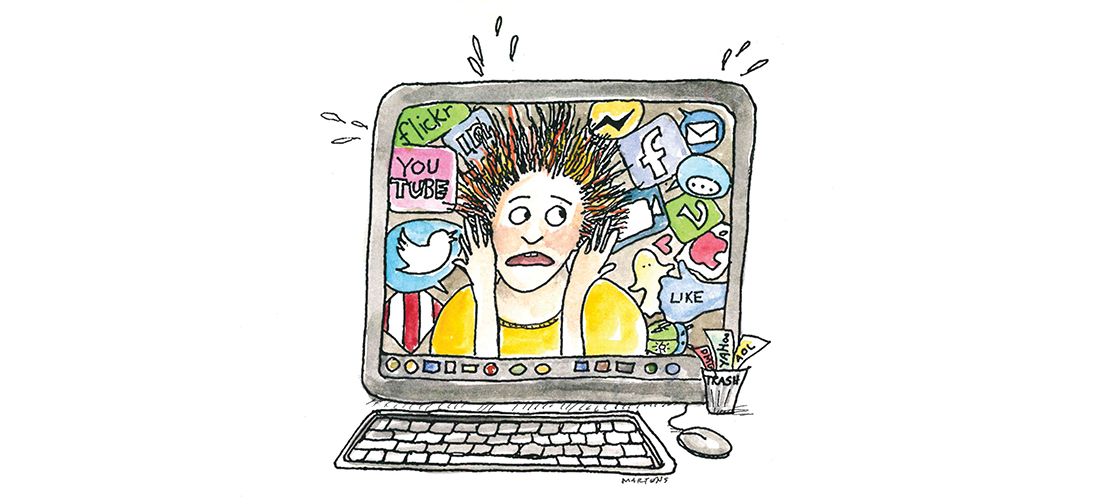
Relevance Is Relative
Put that in your pipe and smoke it
By Susan S. Kelly
If nothing else, these times have taught us that every 15 minutes everything changes: statistics, rules of (social) engagement, open restaurants. Staying relevant has gotten harder than ever. But I try. I do (is “do” the relevant verb?).
Venmo and Snapchat and Twitter. I was an early-adopter of email back in the dinosaur ages of dial-up. Facebook isn’t relevant anymore, ICYMI. I try to keep up with acronyms. LOL and OMG are way, way passé, ICYMI. They’ve been demoted to crossword puzzle clues. I admit to being less than a pop culture maven — I tried Game of Thrones, I really did, but there were just So. Many. Bad. Guys. But the degree of my deficit really hit home in a recent New Yorker cartoon by Roz Chast. She’d drawn a character whose dreams were compartmentalized and labeled with words like “existential threats,” “angst,” “unspecified anxiety,” and “fantods.”
Fantods? What the heck are fantods? Some New Yorker-y thing, I comforted myself, an acronym for uber-cool Manhattanites. But no, fantod is right there in Merriam-Webster: a state of extreme nervousness or restlessness. And just like that, my vocabulary relevance has been downgraded.
It’s hardly the first time my relevance has come into question. When my daughter looked at my country songs playlist, she rolled her eyes. “What?” I asked.
“The Dixie Chicks’ Wide Open Spaces,” she said with a sniff. “So predictable.”
Well, we all know how that turned out. The Dixie Chicks don’t even have a relevant name anymore.
A few years back I went to a performance of Thornton Wilder’s Pulitzer-prize winning play Our Town. Along with the cast biographies, the playbill listed a helpful glossary of terms used in the production. “To string some beans,” was one entry. “A process by which green beans are stripped of their ‘string’ seam by breaking the tip, usually with a fingernail, and pulling it down the length of the bean.” Hello? The audience needs a definition for stringing beans?
“Catch 40 winks” read another. “To take a short nap.” I mean, as if the play were in Russian. Who knew the expression “40 winks” was no longer relevant? Though to be honest, at our house we refer to 40 winks as a drop-down. I began to understand why as teenagers, my children looked strangely at me when I’d end an argument with the phrase my father always used: “Put that in your pipe and smoke it.” To their credit, and relevance, most things they associated with pipes are illegal substances.
The relevance of graphic novels escapes me too. Comics belong in a twirling rack and portray Richie Rich in a 14-karat gold swimming pool, or Archie and Veronica at Riverdale High, not in an adult-reading genre. (Although I do vaguely recall reading a comic-book version of A Tale of Two Cities at some low point in summer-reading requirements . . . ).
But I’m glad to see Bless Your Heart lose all relevance. Anyone possessed of authentic Southern snark knew about Bless Your Heart long, long before it appeared on cocktail napkins. You’ll have to find another way to criticize and patronize what flies so low it’s undetectable by radar.
No one’s required to stay relevant, of course. My husband gets along just fine without knowing who Pharrell is. When I try to tell him what “meta” means, he nods and goes right back to The Wall Street Journal. The thing is, not being relevant is the same thing as not being at a party. No one notices if you’re not at a party. Think about it. They only notice if you are.
You know what else doesn’t care about relevance? College essay prompts. Year in, year out, the prompts are the same boring choices. What changes are the relevant words you have to use: Cooperation. Collaboration. Global. They’re the vocab biggies right now. But who am I to talk? If I had my way, we’d all speak in old English. “Whan that Aprille with his shoures soote/The droghte of March hath perced to the roote . . . ”
Why else was I made to memorize the opening lines of Chaucer’s Canterbury Tales if not as a safeguard against the fearsome state of complete and utter irrelevance? PS
Susan S. Kelly is a blithe spirit, author of several novels, and a proud grandmother.





